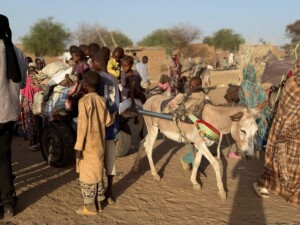Sudan outraged as Ethiopia announces second filling of GERD
Sudan’s Foreign Minister has voiced outrage following an announcement by Ethiopia that it has initiated the second filling of the controversial Grand Ethiopian Renaissance Dam (GERD). Sudanese Foreign Minister Maryam El Sadig El Mahdi, has sent a letter to the UN Security Council, citing the announcement as “a model and proof of Ethiopia’s unilateral action without regard to Sudan’s interests”.
 Grand Ethiopian Renaissance Dam (File photo: SUNA)
Grand Ethiopian Renaissance Dam (File photo: SUNA)
Sudan’s Foreign Minister has voiced outrage following an announcement by Ethiopia that it has initiated the second filling of the controversial Grand Ethiopian Renaissance Dam (GERD). Sudanese Foreign Minister Maryam El Sadig El Mahdi, has sent a letter to the UN Security Council, citing the announcement as “a model and proof of Ethiopia’s unilateral action without regard to Sudan’s interests”.
Ethiopia’s notification comes just one day before a UN Security Council session dedicated to issues concerning the GERD, which is scheduled to begin in New York tomorrow. Foreign Minister El Mahdi, who is current in New York to attend the UNSC session, has told the council that the move by Ethiopia “increases the state of tension and instability in the region,” according to a statement by the Sudanese Ministry of Foreign Affairs.Sudan's Minister of Irrigation and Water Resources, Yasser Abbas, is also in New York to attend the session.
Minister El Mahdi described the unilateral action of Ethiopia as “a clear violation of international law and the Declaration of Principles, and an imminent danger and threat to Sudan,” and that “this notification is useless unless negotiations and agreement are made regarding filling and operating the dam”.
The statement stressed that the final, binding agreement is the only evidence of the Ethiopian desire to cooperate, and the statement considered that attempts to block the path to international support for the Sudanese just demands regarding the dispute over the Renaissance Dam are futile.
Controversies
The dam, Ethiopia’s intention to fill it, and the ramifications to Sudan and Egypt downstream have been the subject of sharp and often fruitless negotiations, which are now progressing due to international efforts at mediation.
In May, 22 NGOs warned of military confrontations between the three countries if the long-running dispute between the governments of Ethiopia, Sudan, and Egypt over the building, filling, and operating of the GERD is not resolved quickly.
“The project is expected to have profound effects on the future of the three countries and the African sub-region. While it represents an important development opportunity for Ethiopia as its prime owner, the impact of GERD on Sudan and Egypt cannot be overlooked”, their statement read.
* Ethiopia began to build the GERD in 2011 at the source of the Blue Nile, near the border with Sudan, and the dam is currently in the final phase of construction. In August last year, Addis Ababa unilaterally began filling the dam reservoir.
The Blue Nile contributes approximately 85 per cent to the volume of the main Nile River. Both Egypt and Sudan heavily depend on the waters of the Nile to meet the demands of their growing populations.
The three countries signed a Declaration of Principles in Khartoum in 2015 as a basis for negotiations, but no agreement on the use of the Nile waters has been reached so far. More than once, negotiations under the auspices of the Africa Union ended in a deadlock. Recently, the EU and the USA have both expressed their willingness to mediate between the three countries.











 and then
and then